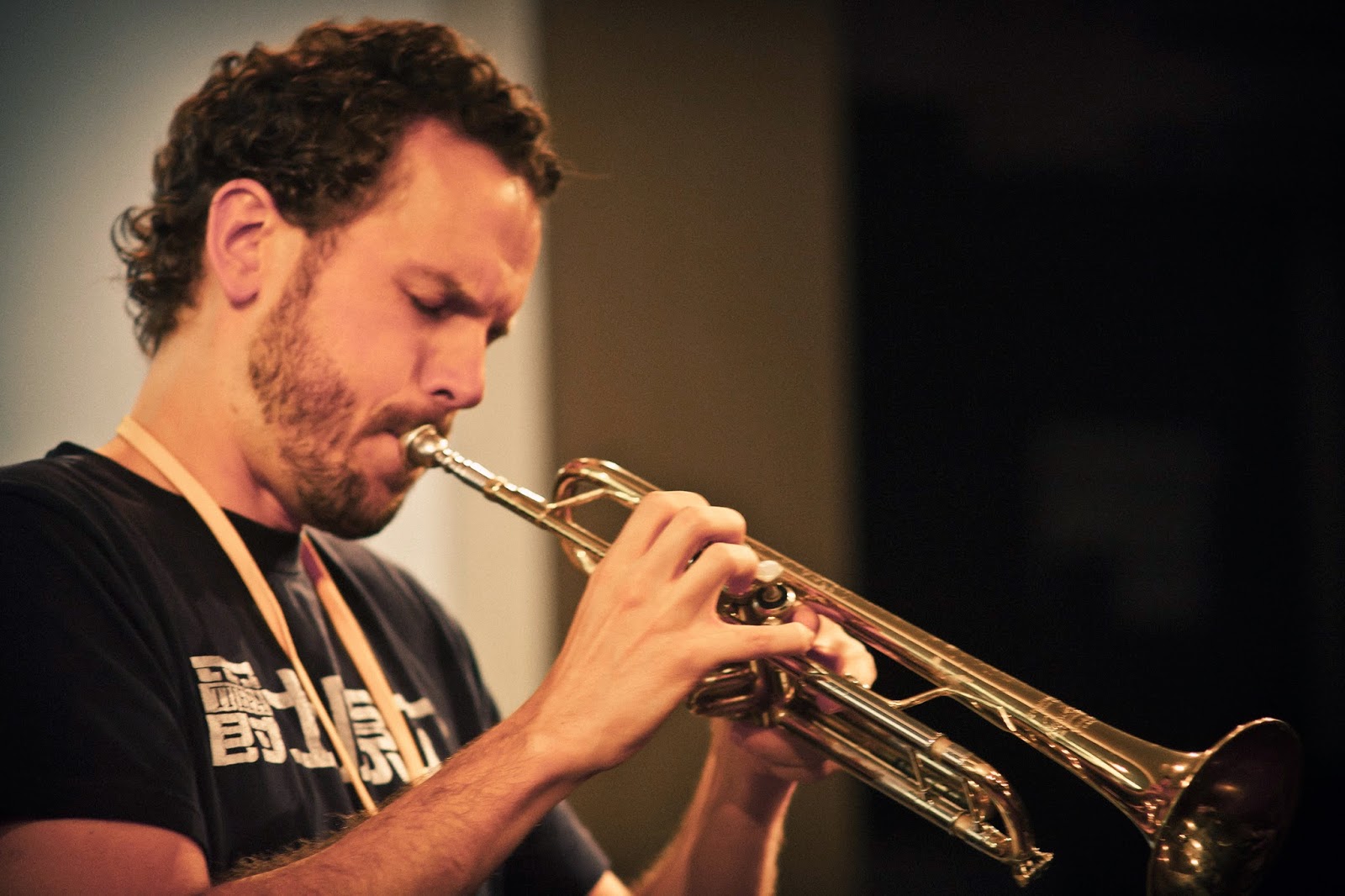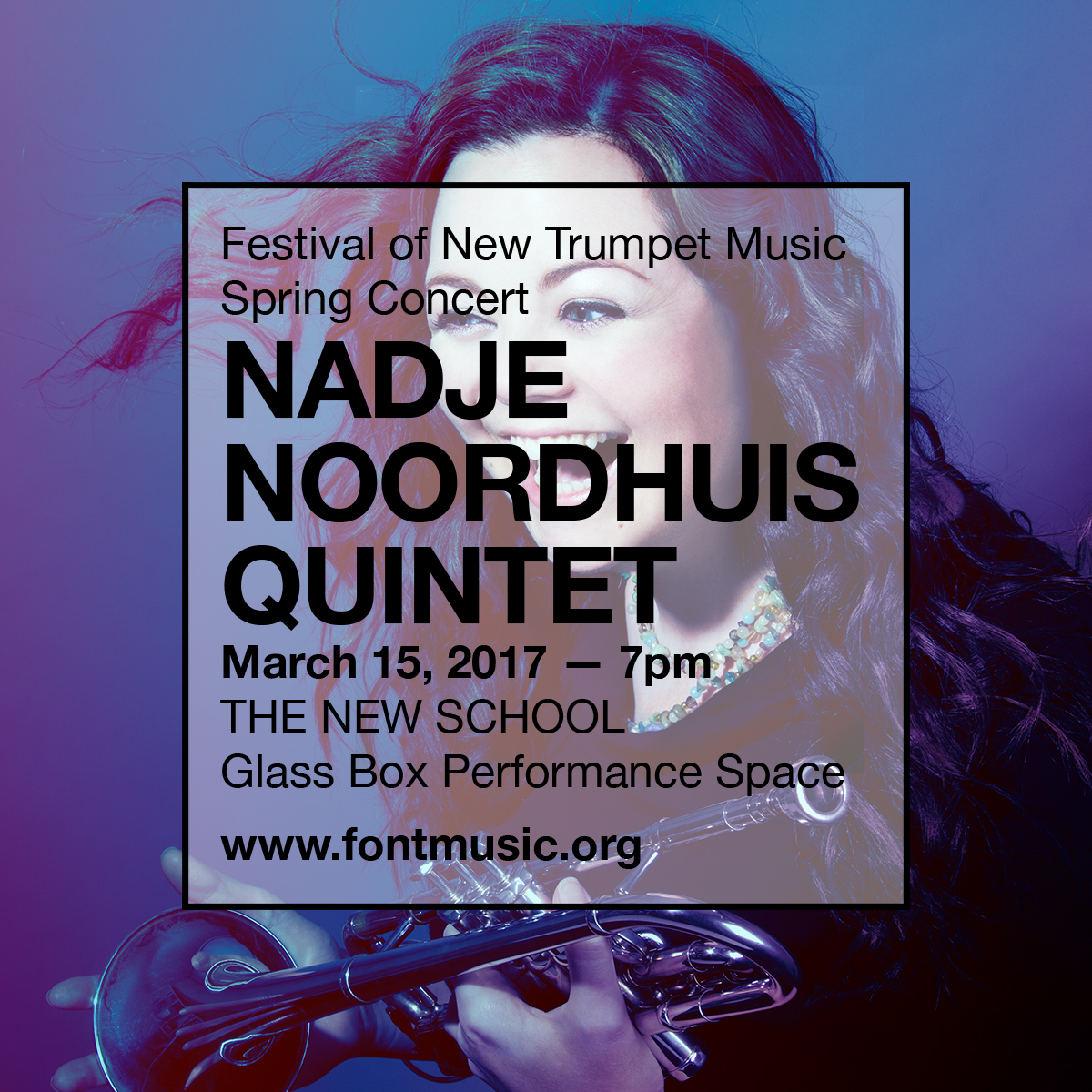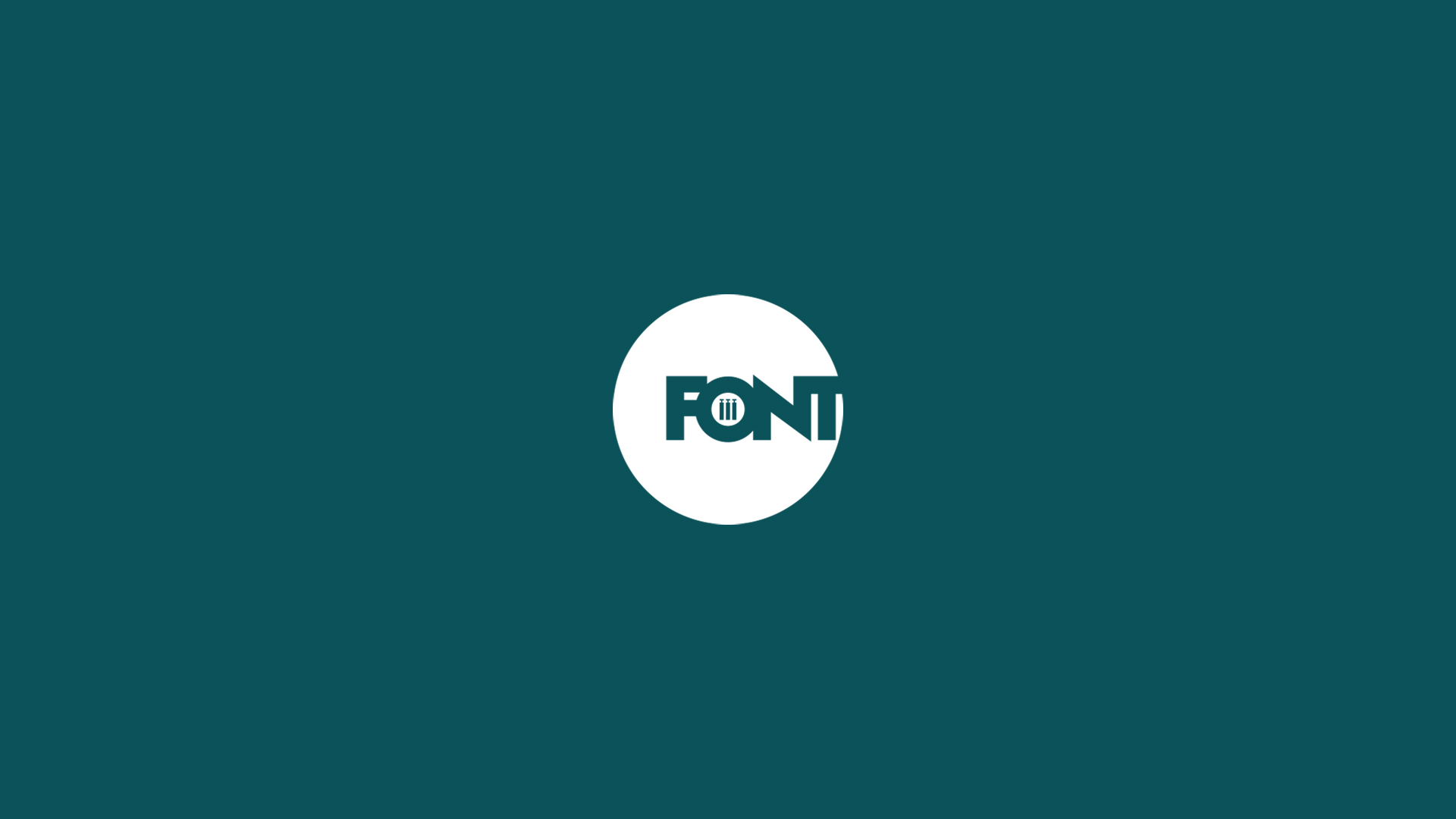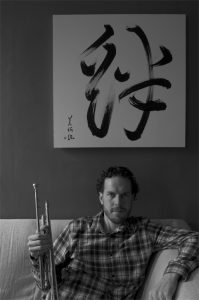 We are delighted to present a very insightful chat with NYC based trumpeter, David Smith. A heavy presence on the NYC creative music and jazz scene, David is the whole package – composer, band leader, educator, performer, father, husband and all around great guy! It’s a pleasure to dig into some heavy subjects with him on the trumpet, NYC’s current scene, recording and life – be sure to check out his group at ShapeShifter Lab on February 9th!
We are delighted to present a very insightful chat with NYC based trumpeter, David Smith. A heavy presence on the NYC creative music and jazz scene, David is the whole package – composer, band leader, educator, performer, father, husband and all around great guy! It’s a pleasure to dig into some heavy subjects with him on the trumpet, NYC’s current scene, recording and life – be sure to check out his group at ShapeShifter Lab on February 9th!
Thanks for chatting with us today, David! Talk to us a little bit about your past – where are you from? What was your music experience like growing up and how did you end up in NYC?
I’m from Toronto, Canada, though I began playing trumpet in 4th-grade band when my family was living overseas in Riyadh, Saudi Arabia (!) for a number of years. I was really late coming to jazz, I had relatively little exposure to it until late in high school but an inspiring music teacher named Brian Turnbull and a rapid sequence of events led me to switch from an engineering track and pursue trumpet performance seriously. Once I started down that road I got deep into it and spent some years in school and playing professionally in Toronto. I wound up in New York with the encouragement of a great drum guru up there named Jim Blackley that never played in public but had sessions at his house two or three days a week, as well as my close friend Kenji Omae who was my roommate for many years and is an outstanding tenor player that lived here for a few years but now lives in Seoul, Korea. Fortunately for me, I’m a born dual-citizen so making the move was as simple as putting my stuff in a truck and making the drive, and extra fortunate for me, I received a grant from the Canada Council to study with Laurie Frink for my first year here. Over the years in New York I’ve been lucky to have a lot of opportunities to play great music with great musicians, and it’s been one long, continuous lesson.
Remind the readers, when did you perform last with FONT Music?
I played at Douglass Street Music Collective (RIP) in 2013 with my band, Rich Johnson was kind enough to invite me. I wrote some new music premiered on the gig and that ended up being part of my most recent record, Impetus.
(check out “Halloween Song” from his FONT Music 13 Performance below at Douglass Street Music Collective)
There is a large “Canadian Born” jazz scene here in NYC, which you are obviously a part of. Can you speak into that? Do you still have a strong connection to Canada?
Yes there is and that’s a great thing. In 2000 when I moved here I don’t think it was quite the same case, though there were definitely some notable players like Seamus Blake, Ingrid Jensen, Grant Stewart and John Stetch. It seems to me that in the last ten years or so the number of players coming down to study has increased a lot, and a reasonable percentage of them stay so now the community is fairly large. I still have a connection to Canada, most notably I think in my general mindset and of course my formative years as a jazz trumpet player were informed by the scene there. I haven’t played up there as often as I’d like recently, my parents moved a good distance away from Toronto some years back and so trips up to visit them don’t generally coincide with connecting with the scene. It always feels like a breath of fresh air when I go though!
You’ve been in NYC for many years and have become a strong member of the creative jazz community here. Would love any of your insights and observations as to how that community has evolved and changed over the years and the direction it is going.
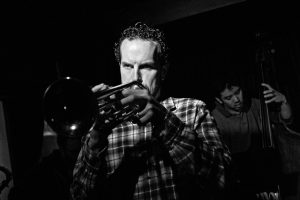 I have to say there are some parts of New York living that I could do without, but the jazz community here is incredible. There is a comradery and sense of shared purpose that I think makes for a productive atmosphere in the broad sense. I’ve noticed changes over the years, but I think the scene today is very healthy despite the usual practical challenges that are requisite of being a jazz musician. I think chief among them is the rising cost of living in NYC, not that it was ever cheap or easy, but it’s risen pretty dramatically in the last several years. Having said that, I recall in a lesson with Laurie Frink in 2000 she said to me, “I don’t know how anyone makes a living any more as a musician…”, so perhaps I’m just that much older! There are still neighborhoods around with high concentrations of musicians, but the more the gentrification process happens the more spread out everyone becomes and it runs the risk of eroding the community aspect of the scene. One other change I’ve seen is the relative explosion of the large ensemble scene. I think this is really positive and a distinct source of creative energy in jazz right now. I’ve been very fortunate to play in a lot of different bands, and it still boggles my mind to think of how many there are. It’s very inspiring to hear so many different and great approaches and I find my (small group) music is often impacted by experiences I’ve had in one large ensemble or another.
I have to say there are some parts of New York living that I could do without, but the jazz community here is incredible. There is a comradery and sense of shared purpose that I think makes for a productive atmosphere in the broad sense. I’ve noticed changes over the years, but I think the scene today is very healthy despite the usual practical challenges that are requisite of being a jazz musician. I think chief among them is the rising cost of living in NYC, not that it was ever cheap or easy, but it’s risen pretty dramatically in the last several years. Having said that, I recall in a lesson with Laurie Frink in 2000 she said to me, “I don’t know how anyone makes a living any more as a musician…”, so perhaps I’m just that much older! There are still neighborhoods around with high concentrations of musicians, but the more the gentrification process happens the more spread out everyone becomes and it runs the risk of eroding the community aspect of the scene. One other change I’ve seen is the relative explosion of the large ensemble scene. I think this is really positive and a distinct source of creative energy in jazz right now. I’ve been very fortunate to play in a lot of different bands, and it still boggles my mind to think of how many there are. It’s very inspiring to hear so many different and great approaches and I find my (small group) music is often impacted by experiences I’ve had in one large ensemble or another.
Give us your insights into being an educator. I know you’re on staff at CUNY and have done other clinic based work, but how do you see being an educator interwoven into your musical life? How much of your “work” is in the education side?
I have always done quite a bit of teaching, pretty much since day one of arriving here. It’s been a source of stability and it’s also something I enjoy a great deal and feel a certain aptitude for. It helps me connect with my own musical inspirations, as I draw on those to communicate to and inspire students, but of course I’m also inspired by the experiences of working with students. There’s a “community service” side to it where I think music has taken a real hit in modern times in terms of the general public’s awareness and some of what I do is working with people that are not necessarily active musicians. It’s always a challenge balancing the teaching and playing, I’ve always thought of myself as a player first and foremost, but teaching requires commitment to do it well and it’s a constant challenge to find the right balance.
Can you talk into your progression as a trumpeter since moving to NYC?
As I alluded to earlier it’s been one long lesson since I got here, and thankfully I’m still growing. Probably the best part of New York is the *constant* kick in the ass from players around me, and it continues to push me to grow. When I was young I was never a particularly strong player in the physical sense but there are so many players around that are and so that has demanded a significant chunk of my practice time over the last fifteen years. I’ll think I’m making some good progress and then I’ll be at a rehearsal and hear Jonathan Powell warm up…
Jonathan is scary great and inspiring as a trumpeter, for sure! How about your progression as a composer?
Certainly a significant factor in my development was the decision to spend more time writing and start a band, a little over ten years ago. I had dabbled in composition prior to that, but once I spent more time on it and tried to figure out what it is I wanted to say I discovered that composition is a very important part of my musical life and one that I’m proud of. It also helped me focus my artistic identity and the process of recording and booking gigs opened up a whole other world of things to learn. As a dual-citizen that spent a good chunk of my early youth in Saudi Arabia, my “roots” are somewhat scattered and it was a challenge digging down to find out who I am and what I want to say, but pursuing my own music has allowed that to come into much clearer focus. You mentioned family, I have a couple of kids now and that has become an important part of my life. It has also forced me to grow as a person, and along the way some of the emotions have provided good material for music.
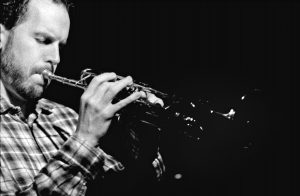 You have recorded many times with different labels. Where do you stand on the importance of recording and documenting your work?
You have recorded many times with different labels. Where do you stand on the importance of recording and documenting your work?
Hmm, well first in the spirit of full-disclosure I think I should mention that in the last few years I’ve become involved with Brooklyn Jazz Underground Records, a small (but growing) independent label. I definitely think recording is a different thing than performing, as it is producing a product that is a formal artistic statement and is released to the world as a documentation of that artistic statement. I think it’s so important to do it and get it out there, however one chooses to, and also to make an effort to get it heard. In today’s digital world with YouTube clips and countless other “snippets” of players, albums still stand in stark contrast as formal documentation, and it requires a different consideration of the conception than playing a tune on a gig that someone caught part of with an iPhone. In terms of how things are released, there are more options today than there ever have been, and each has possibilities. Major record labels still play a role, independent record labels play a role and many people put out fantastic records entirely themselves, they all can work. There are reasons to go each way and not to go each way, I think I’d recommend to anyone to explore each and start with the possibilities, and then from there consider the options and what best fits what they want to do with the recording.
You are such a strong and agile trumpeter – what are some consistent things you regularly do to both maintain and grow as a trumpeter? Has that changed over the years? If so, how?
Well, that’s kind of you! Like most trumpet players dealing with the instrument is a constant challenge/battle/source of humility for me but I have to say the sadist in me enjoys the struggle. Not only that, as I’m now entering my third decade of professional playing, it is extremely satisfying to continue to make progress where bit by bit that struggle pays off in small little chunks. I’ve never really been a “routine” trumpet player in terms of long-term dedication to a specific set of exercises, but at any given time there are a few things that I try to do consistently. These days I feel like I have more of a conception of exactly what should be happening when I play, and that tends to direct my practice more than the other way around where completing a given set of exercises is the focus. I’d say earlier on I was doing more of the latter, and there have been periods of several months or even a couple of years where a particular routine was working well for me and I did them religiously (for example when studying with Laurie Frink). The demands of working as a trumpet player are particularly (mostly?) physical and so I do put a fair amount of effort into becoming a “stronger” player, and of course that often is accomplished by relaxing and working *less* hard physically while playing. But to be a bit more specific, I’ve always worked on intervallic things like triads and other chords and opening them up, as well as opening up pentatonic scales to explore the intervals within. I’ve also been fairly consistent about working on classical stuff, whether it’s etudes or solos or playing duets with friends. About twenty years ago I heard Brad Turner play in Toronto, hearing him freaked me out, and when I talked to him his advice was to play lots and lots of Charlier, something I took to heart.
Your vocabulary as an improviser and composer is pretty unique. Where have you gotten your inspiration? Have you seen an evolution of that over the years?
One of the first players I got into in college was Clifford Brown, and for a couple of years I did nothing but listen to records of him, learn his solos, learn his tunes, etc. This was great for learning how to play changes, but at some point I came to realize that the “typical” trumpet vocabulary just wasn’t me, it never felt genuine. Toward the end of college I had the opportunity to study with Charles Tolliver, and I think that experience was the beginning of what set me on a different path that ultimately felt much more genuine. He turned me onto Booker Little and that really opened my eyes to some different trumpet language and the pursuit of it, I remember “Milestones” and “You Stepped Out of A Dream” were a couple of solos that I learned that really impacted me. Once I started down that path there was Tom Harrell and Woody Shaw, but around that time I started living with the aforementioned Kenji Omae and another great tenor player Trevor Hogg for what was ended up being a number of years and I was really heavily influenced by the saxophone approach/language. So I was learning Steve Grossman licks and Coltrane solos and later on Joel Frahm and Chris Potter and Mark Turner, and seeing how it worked to apply that stuff to the trumpet. At some point in there I also started listening a lot to classical music, a lot of Mahler, Bartok and Bach and that was having a significant impact on my artistic mindset. This later led to studying counterpoint and harmony with a great teacher named Donna Doyle, and that really opened my eyes to a lot of stuff and let me to hear music a different way. When I started spending more time on my own compositions I would occasionally find something that felt very “me” and so then I would pursue that a little further. More recently with my creative involvement in the creative big band music scene I’ve gotten to hear a lot of different approaches, and among other things I think that experience has allowed me to get more in touch with the 12 year-old me that was listening to a lot of rock music. Guys like Darcy James Argue and Nathan Parker Smith have showed me how those influences can work in a jazz context, where previously I think I always felt those musical roots I had were at odds with my jazz and creative adult self, and that’s something that’s involuntarily showing up more in my music.
(Check out David as a featured soloist with Darcy James Argue’s Secret Society at The Kennedy Center in 2011 with fellow FONT Music Alums in the section Matt Holman & Nadje Noordhuis)
You have truly crafted a career as a unique creative trumpet artist – in this day and age that’s a rare thing, especially with a family and in a society that doesn’t always compensate an artist at the level s/he should be. How have you been able to keep the focus and create that career longterm?
Well, it’s very tough of course as I imagine most people reading this can identify with. But over the years I’ve had to figure out ways to make money and keep that going, but none of that would make any sense if I wasn’t pursuing my own music and career. Doing so keeps me in a healthy mindset that for the most part has kept bitterness at bay, and there’s a symbiosis there. The artistic endeavors satisfy the artist in me, and the financial endeavors allow me to continue to pursue the artistic endeavors. On very rare occasions the two meet and those are very good days.
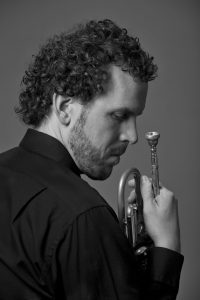 How have you found the balance between having a family and continuing an ongoing and growing musical career?
How have you found the balance between having a family and continuing an ongoing and growing musical career?
It’s tough in terms of the time demands of a family, but then I feel that the kind of personal growth that I’ve experienced as a result of having a family has really positively benefited me as an artist. I’ve also been very fortunate to have a wonderful wife that fully supports me and at times has heavy lifting at home while I’m working on some writing or have a gig that requires a lot of preparation or even playing sessions. I of course have to keep that in balance too but she understands why I need to pursue my artistic career, and I’m just lucky she’s been so staunchly behind me.
Are there any projects we can spotlight for you coming up or even in the works down the road. Big gigs? Recordings? Tours?
I have a gig coming up on February 9th that I’m looking forward to. My band will play ahead of John Yao’s 17-Piece Instrument at Shapeshifter Lab and we’ll continue working on some new tunes that are in the development stages I suppose. I also have another gig with my band in the afternoon on March 1st at the College of Staten Island where I’m an adjunct, though I know that’s a bridge too far for some… I just did a couple of different big band recordings that are both going to be excellent. One was with Frank Carlberg and the other was with Andrew Rathbun, I’m looking forward to hearing the final product with those, both were great experiences. I have a number of sideman gigs coming up, one in particular that I’m looking forward to is getting to play with Matt Wilson for the first time on February 24th at Barbes with Andy Biskin’s 16 Tons (clarinet, three trumpets -!- and drums). If I can plug my website it’s www.davesmithtrumpet.com and from there people can check out my schedule to see what’s coming up.
David, thank you so much for chatting with us – always very insightful to talk with you! All the best to you!
(Below is David’s composition Charade from his performance last year at Cornelia Street Cafe)
